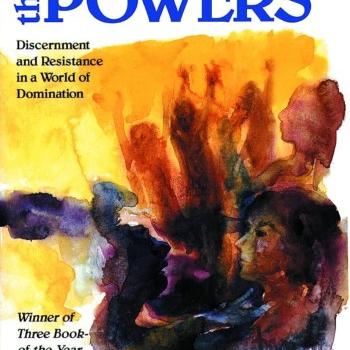Back in the ’80s, when my dad was still an attorney in New Jersey, he was researching a property deed in North Plainfield. The deed he found, written in the 1930s, had a “restrictive covenant” — a stipulation in the contract that forbid the property from being resold to “Negroes.” Dad was dismayed, but also curious, because our church had purchased its property around that same time in that same neighborhood.
So Dad checked into that and discovered that yes, alas, the original property deed for our own Hydewood Park Baptist Church also included a restrictive covenant intended to preserve a whites-only neighborhood.
My dad showed what he’d found to the man who was then our senior pastor and he was furious. At my dad. Pastor Urey grew angrily defensive. What’s your point? That was a long time ago! It’s not like I signed that, and we certainly wouldn’t today, so why dig up old dirt?
Ten years later, after that guy had moved on to a bigger, fundier church, my dad told that story to our new pastor, a man named Steven Fletcher. He had a very different reaction. Pastor Fletcher grew sad, and quiet, and thoughtful. “It makes you wonder, doesn’t it?” he said. “What are we doing now that people in this church will look back on in 50 years in horror, asking ‘How could they have done this? How could they have ever thought this was right?'”
The opposite responses of those two pastors is instructive. The ugly defensiveness of the first is stupefying — a form of self-reinforcing foolishness that prevents us from ever learning, growing, or correcting any mistakes. Pastor Fletcher’s chastened humility seems not just wiser but also more constructive. It allows for the possibility of learning, growing, and improving — for the possibility of something other than blindly repeating and doubling down on all the mistakes of the past.
So I appreciated the intent of a recent Twitter mini-sermon from white Reformed mega-pastor Tim Keller. I think he was aiming for the same kind of humility that marked Pastor Fletcher’s response to that shameful restrictive covenant my dad showed him. But then, alas, Pastor Keller tripped over the plank in his own eye.
Here was Keller’s tweet:
The sin of slavery is so obvious to us now, but for 1000s of years everyone saw it as just a part of life. It's arrogant to think that 100 years from now our ancestors won’t see us as having similar blind spots. What are they?
— Timothy Keller (1950-2023) (@timkellernyc) May 18, 2022
Here’s the text of that: “The sin of slavery is so obvious to us now, but for 1000s of years everyone saw it as just a part of life. It’s arrogant to think that 100 years from now our ancestors won’t see us as having similar blind spots. What are they?”
The warning there about “blind spots” is wise and thoughtful. This calls for humility. The thing about blind spots, after all, is that we can’t see them. As Pastor Keller says, it would be foolishly “arrogant” for us to presume that we don’t have any such blind spots just because we can’t see what they are.
But the other thing about blind spots is that they’re a consequence of where one is sitting. My context limits my perspective such that, from where I’m sitting, some things are hidden from my sight. But just because I can’t see them doesn’t mean they’re invisible. Other people — people who aren’t me and who aren’t sitting exactly where I’m sitting — can see them just fine.
Keller’s chastened humility is an excellent starting point. But it’s also a terrible stopping point.
And — since we’re dealing here with my elaborately biblical white evangelical kinfolk — I’d add that it’s a completely unbiblical stopping point. There is, after all, an extremely famous biblical passage on exactly this matter of blind spots. Even people who never go to church except for weddings know this one.
“For now we see through a glass, darkly,” Paul wrote in 1 Corinthians 13, “I know in part.”
We mortal humans are stuck here, with — at best — partial vision and partial knowledge. Blind spots are part of the package. But if that were the last word on blind spots then we wouldn’t read this passage at weddings. Paul goes on to remind us that there are some things that “abide” — some things we can rely on even if it’s never possible for us to rely on perfect sight or perfect vision or perfect knowledge: “These three remain: faith, hope and love. But the greatest of these is love.”
Paul there isn’t offering a moral commendation of love, but an argument for its epistemological necessity. “The greatest of these is love” is not simply saying “Love is really neat.” It’s saying that love is the only solid basis we have for truly seeing or for truly knowing. Love is the only way to overcome our blind spots.
Pastor Keller’s tweet got a lot of attention, but that wasn’t because of what he told us about “blind spots.” It was because of what he showed us about them. “The sin of slavery is so obvious to us now,” he wrote, “but for 1000s of years everyone saw it as just a part of life.”
“Everyone”? What do you mean “we,” Kemosabe?
Keller’s pratfall there reminds me of our discussion some years back of “The Hole in Noll.” I am a huge fan of historian Mark Noll’s terrific book The Civil War as Theological Crisis. It’s an insightful, deep dive into the centuries-long argument among white American Christians over slavery and the Bible. Noll does a terrific job of collecting and summarizing the “biblical” arguments being made by both pro-slavery and anti-slavery white Christians, highlighting the ways that these arguments shaped and were shaped by the different ways those white Christians preferred to read and interpret their Bibles.
Noll’s history proves that there was never a time when the obvious sin of slavery was a blind spot for “everyone.” Not even among the white American Christians his history is almost exclusively concerned with. It won’t do to suggest that someone like, say, George Whitefield was innocently blind to the sin of slavery when his fellow Christian Benjamin Lay was loudly condemning its obvious sinfulness. (Even if Whitefield somehow managed to avoid paying attention to the theatrical, cave-dwelling, hunch-backed dwarf running around stabbing bleeding Bibles in churches, he surely heard about him from their mutual friend Ben Franklin.)
And if those pro-slavery white Christians were so confident that “the Bible” defended their theft, rape, torture, kidnapping, and flesh-peddling, then why was the version of the Bible they produced for their slaves so heavily redacted and painstakingly edited? The editors of that Slave Bible seem to have been able to trace the outlines of their “blind spot” with exacting precision.
But the biggest problem with Keller’s “everyone” is the same problem as the huge hole in Noll’s history. That “everyone” excludes the clear vision and superior knowledge of the millions of Christians and other people who were, themselves, enslaved. The obvious sin of slavery was never, for them, a “blind spot.” They saw. They knew. And they said so, even at incalculable personal risk.
White Christians heard them say so, but chose not to listen. That deliberate choosing isn’t anything that can accurately be described as a “blind spot.” When you jam your fingers in your ears and shout “La la la — I can’t hear you!” the problem cannot be described as one of imperfect hearing.
(And it won’t do — as Keller attempts — to retreat to some more abstract, longer history of slavery beyond the specifically brutal race-based American form of it. The sin of slavery was obvious to St. Patrick. And it was obvious to Onesimus.)
This brings us back to Paul’s reminder of the abiding epistemological necessity of love. Love enables us to know better and to see better and to hear better because love compels us to listen to those who are not sitting exactly where we’re sitting. It compels us to seek out and to learn from the victims of the obvious sins to which we’re fortunate enough to be obliviously blind.
We don’t have to sit there, sadly humbled and forlorn like Keller and sweet old Pastor Fletcher, worried and wondering about whatever it is that we might be doing that future generations may find appalling. “Everyone” isn’t in the same position as we may be. We can find them. And ask them. And listen.
That requires not just a chastened humility, but also these three: faith and hope and love. And the greatest of these, etc.












